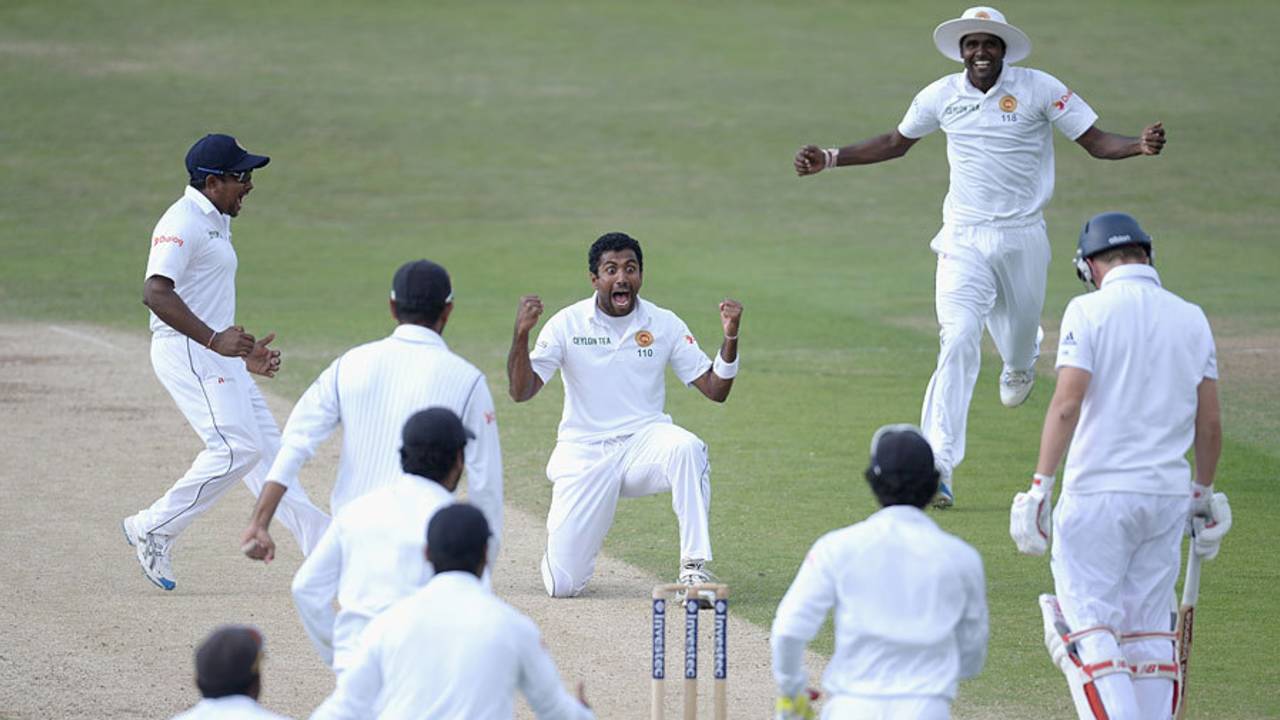What a battle. What an epic struggle. This was bare-knuckle stuff. For ten days and 30 sessions, two teams hammered at each other. The triumph, in the last few minutes of a three-week contest, demonstrated once again that nothing has the capacity to deliver drama and tension like the slow burn of Test cricket. This historic Test series victory may in the long run be of more significance to Sri Lanka than the World T20 victory in Bangladesh. The win proved they can succeed outside Asia in the most important format of the game.
Sri Lanka won by playing tough, bloody-minded cricket, refusing to take a backward step, on or off the pitch. Their attitude alone is worthy of celebration. The tone was set by the captain.
Angelo Mathews demonstrated grace under fire in dealing with the controversies around Jos Buttler's dismissal and Sachithra Senanayake's action. If anything, those controversies strengthened his and the team's resolve. Mathews was also willing to mix it with his opponents, in the vanguard of verbal salvos fired at Joe Root during the final innings
at Headingley.
Importantly, he was able to take it as well as dish it out, compiling a composed 42 runs in the final ODI, when every Englishman and his dog was baying for his head.
There is a great deal more to Mathews than bug-eyed belligerence. A young man with vastly more senior lieutenants, Mathews led the team with unflappable calm and unyielding conviction. If the two teams could only be separated in the final few minutes of the series, the fortunes of the respective captains could not have been more different. Mathews out-captained his more experienced counterpart, rotating his bowlers in that series-defining final session with inventiveness utterly beyond poor
Alastair Cook. With bat and ball, Mathews was magnificent. His 160 in the second innings was one of the great captain's knocks, an object lesson in shot selection and controlled destruction (if not in running between the wickets). He also took four first-innings wickets, crucial to keeping Sri Lanka in the game. It was boy's own stuff, outdone only by the firework finish supplied by Shaminda Eranga.
Throughout the team, in every department, Sri Lanka demonstrated a capacity for the fight. It seems to have become inculcated in the team culture. The current crop of Sri Lankan cricketers expects to be competitive whenever they step on the field. This self-belief started, of course, with Arjuna Ranatunga, who added grit and fight and uncompromising cussedness to a team of talented amateurs. From Rangana Herath's three-hour vigil for the eighth-wicket partnership, to Nuwan Pradeep's last-over defiance, and Eranga's miracle delivery, Sri Lankans displayed what the Australians call ticker.
The two senior citizens contributed mightily, both to performance and attitude.
Kumar Sangakkara, with his acerbic sledging and gimlet-eyed combativeness, has always been an irritant to opponents. He finished with a series-topping
342 runs at an average of 85.50.
Mahela Jayawardene, the modern maestro of silken strokeplay, presents a more genteel image. But deep within him lies a core of steel. If Michael Holding was "Whispering Death", Mahela is the softly spoken assassin. His press conference after the fourth day at Headingley was a masterclass in stealth warfare. In his quiet, understated way, he fired barbs laced with sweet poison at Cook and the England team, who were, he said, not up to it under pressure.
That Mahela, of all people, put his boot on Cook's throat when the English captain was so obviously down hinted at the Sri Lankan team's displeasure. They were riled by the controversies during the ODI series, not least Cook's petulance, and at the reduction of the series to two Tests. They responded by fighting, with the bat
at Lord's where they battled to the game's dying breath for a draw, and with everything they had at Headingley. The fighting spirit was best exemplified by the seam bowlers. Derided as a county attack before the series started, they replied by teaching the English seamers how to bowl in their own conditions.
Lamenting the series loss, Cook stated England had won eight out of the ten days, which misses the point by a country mile. Crucially, in the pressure moments that define Test matches, Sri Lanka were more desperate, more determined, better equipped to handle the pressure. An unruffled commander, battle-hardened veterans, ambitious youngsters, a home-grown coaching set-up, fired-up bowlers, all these were important ingredients in Sri Lanka's win. But the most important factor that allowed a Sri Lankan unit, individually and collectively, to outperform their hosts, was heart.
